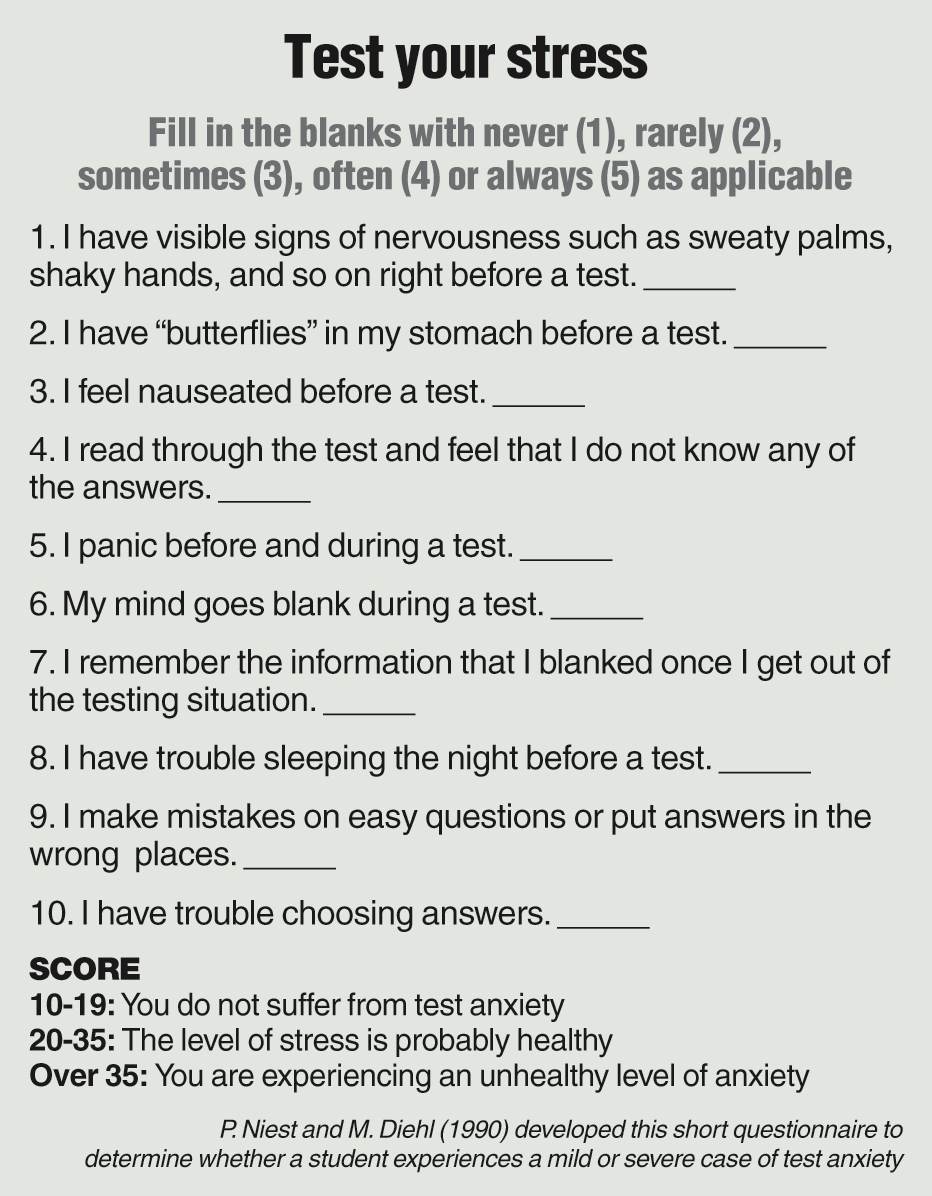As a teacher, I often witness the disastrous effects of examination anxiety. Some of my bright students who answer all my questions with gusto in the relaxed setting of a classroom, including complicated ones, crumble unwittingly during tests. As a result, these otherwise intelligent kids always get poor grades.
During adolescence, many students report such anxiety. According to Jerrell C. Cassady, an American educational psychologist and editor of the book, Anxiety in Schools, test anxiety affects up to 40 per cent of all students. “Research on test anxiety has demonstrated negative correlations with IQ; course performance in math, statistics, reading, foreign language, science and psychology; study skills and abilities; problem solving skills; and basic memory process,” he writes.
A study found that 13 per cent of all undergraduate students in Germany seek counselling for test anxiety. Unfortunately, while the problem is widely recognised in India, students rarely seek any help. Dr Subhrangsu Aditya, a psychiatrist attached to the Centre for Counselling Services and Studies in Self Development at Jadavpur University in Calcutta, says anxiety before tests or any other crisis in life arises out of apprehension or imagined fear of negative consequences.
Agrees Vikram Kirtikar, who is a psychologist at MPower, a mental health foundation in Mumbai. He says, “Exams can be a stressful period for most students.”
Students who seek relief from their exam anxiety are usually offered a combination of psychotherapy and anti-anxiety medication. An increasing number of college students are also turning to neuro-enhancing drugs, such as prescription stimulants, to reduce test anxiety. However, use of such drugs is a concern for safety, especially when it targets an adolescent with a still developing brain.
A new pilot study by a group of German researchers, led by Michael Schaefer of Medical School Berlin, suggests there may be an alternative to these drugs — a placebo.

The Telegraph
A placebo is anything that seems to be a “real” medical treatment but isn’t. It could be a pill, an injection or any other type of “fake” treatment as it does not contain an active substance meant to affect the body. Placebos have long been used to alleviate symptoms of a variety of ailments, including pain, insomnia and irritable bowel syndrome. How placebos work is unclear but it is thought to relate to the relationship between the body and the mind. Some experts have shown that even though it seems to be all in the mind, there are measurable physical changes in the body caused by a placebo, such as rise in hormones that ease depression.
Conventional placebo treatment, however, requires some deception because people receiving the treatment are told that they are getting an active treatment. That is why administration of placebo is considered somewhat unethical. But the experiment conducted by Schaefer and his team involved the application of a different type of placebo — called open label placebo (OLP) — in which the recipients are informed that they are having a dummy medicine. In the study, the scientists chose 58 university students sitting end-term exams. Half were given a placebo for a fortnight and told there were no active substances. But they were also told that placebo effects could be powerful and that the body may respond automatically. Despite knowing the pills were fake (the tablets contained sugar, wheat, cornstarch and glucose syrup), students reported they had reduced anxiety about the test.
The researchers can’t explain why the students’ anxiety decreased even when they were aware that they were taking placebos. Their conjecture is that since the students were told that the placebo could work wonders, it was enough to give them confidence and reduce their fears about the test. Taking the pills each day at a designated time also may have encouraged participants to think about test anxiety and may have provided a sense that they were doing something positive to address their problem.
Dr Aditya stresses that positive thinking is the key to handling anxiety. He says, “To boost confidence one must prepare in a planned manner well in advance.” He advises students to not consume bland food but happily give in to their craving for spicy food such as chicken pakoras and fish fries. “Proteins have amino acids that activate neurotransmitters or chemical messengers in the brain supposed to transmit signals from one neuron to another.” In other words, it keeps the brain active and charged to carry on its work.
To help the brain work to its full potential, one must also never cut down on sleep. Says Kirtikar, “Having sound sleep and resting enough during exam keeps us fresh as well as helps us retain what we have read. A consistent sleep and wake pattern keeps us fresh and alert.”
The bottomline is that it is better to keep your brain fit than take empty pills to boost your confidence.











